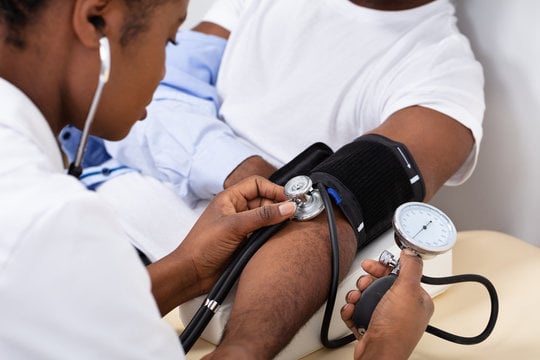Hypertension, often referred to as the “silent killer,” poses a significant public health challenge in Ghana, affecting over a quarter of the adult population and contributing to severe health complications like heart disease and stroke. The insidious nature of the condition underscores the critical need for increased public awareness, regular health screenings, and adherence to treatment plans. Recent efforts by health officials and medical professionals highlight the urgency of addressing this growing concern. Dr. Alfred Doku, Head of Cardiology at Korle-Bu Teaching Hospital, stresses the importance of seeking medical guidance for managing hypertension, particularly for men, as some medications can interfere with sexual health. He emphasizes that alternative treatment options exist and encourages open communication with healthcare professionals to find suitable solutions that promote both longevity and quality of life.
The high prevalence of hypertension in Ghana necessitates a multifaceted approach to combatting the disease. While approximately 27% of Ghanaian adults are estimated to have hypertension, a startlingly low percentage are aware of their condition or have it under control. This disparity highlights the urgent need for widespread education and accessible screening programs to facilitate early diagnosis and prompt intervention. The Greater Accra Regional Health Directorate’s outreach event at the Mamprobi Polyclinic exemplifies the proactive measures being taken to educate the public on the importance of regular blood pressure monitoring and lifestyle modifications. Dr. Robert Amesiya, the Regional Director of Health Services, reinforces this message, urging Ghanaians to prioritize their health by getting checked at least annually and diligently following prescribed medication regimens.
Early detection and effective management are crucial in mitigating the long-term consequences of hypertension. Untreated or poorly managed hypertension can lead to a cascade of health problems, including heart attacks, strokes, kidney failure, and vision loss. By raising public awareness and promoting regular blood pressure checks, health officials aim to empower individuals to take control of their health and prevent the devastating effects of this silent killer. Dr. Doku’s advice regarding the potential impact of antihypertensive medications on men’s sexual health also underscores the importance of personalized treatment plans. Open communication between patients and healthcare providers is essential for ensuring that treatment options are tailored to individual needs and preferences, promoting both physical and emotional well-being.
Several factors contribute to the high prevalence of hypertension in Ghana, reflecting both lifestyle choices and demographic trends. Obesity, physical inactivity, and unhealthy diets are among the leading modifiable risk factors, emphasizing the potential for preventative measures through lifestyle changes. As the population ages, the prevalence of hypertension also increases, highlighting the need for targeted interventions for older adults. Addressing these risk factors through public health initiatives and individual behavior changes is crucial for reducing the burden of hypertension in the country. Promoting healthy lifestyles, including regular exercise, balanced nutrition, and weight management, can significantly reduce the risk of developing hypertension and improve overall health outcomes.
The combined efforts of healthcare professionals, public health campaigns, and individual responsibility are essential for addressing the escalating challenge of hypertension in Ghana. By promoting regular screenings, raising public awareness, and encouraging open communication between patients and healthcare providers, the country can make significant strides in controlling hypertension and reducing its devastating impact on individuals and families. Dr. Doku’s focus on men’s health within the context of hypertension treatment emphasizes the importance of considering the holistic well-being of patients when developing treatment plans. This patient-centered approach is vital for ensuring adherence to treatment and achieving optimal health outcomes.
The fight against hypertension in Ghana requires a sustained and comprehensive strategy. Continued investment in public health education, accessible screening programs, and affordable treatment options is essential for empowering individuals to manage their blood pressure and prevent the devastating consequences of this silent killer. The collaborative efforts of healthcare professionals, government agencies, and community organizations are crucial for fostering a health-conscious environment that supports individual efforts to maintain healthy blood pressure levels and improve overall well-being. By prioritizing prevention, early detection, and effective management, Ghana can effectively address the challenge of hypertension and create a healthier future for its citizens.














